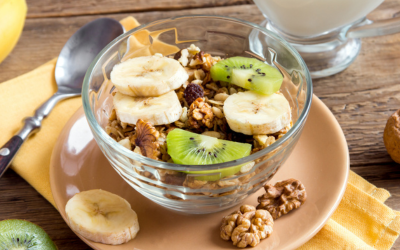Foods that Promote Sleep
We spend a third of our lives sleeping. And, good sleep is vital to our health: It regulates our appetite, blood glucose and hormones, supports maintaining a healthy weight and increases our energy levels. But did you know the foods you eat can also affect the quality of your sleep?
Consuming too much caffeine or eating close to bedtime—especially sugary and processed foods—can negatively impact your sleep. To promote better rest, try avoiding caffeine after noon, incorporating a variety of plant-based foods into your diet, and ensuring you get enough protein throughout the day. These habits can help set the stage for a more restful night.
Nutrients that promote a good night’s sleep
- Whole grains, starchy vegetables and legumes that are high in fiber (brown rice, wild rice, quinoa, barley, winter squash, sweet potatoes, chickpeas, kidney beans and lentils).
- Protein including poultry, fish, lean meat, eggs, nuts and tofu (20% of your calorie intake).
- B Vitamins: thiamin (B1), folate, B6 and B12 (meat, eggs, dairy products, legumes, seeds and nuts, dark leafy vegetables and whole grains).
- Magnesium and zinc (nuts, seeds, legumes and whole grains).
- Healthy fats like olive oil, walnuts, almonds, pistachios, flaxseed, chia seed, pumpkin seeds, avocado, salmon and sardines.
Melatonin is a natural hormone produced in the brain that helps induce sleep. But several factors can inhibit its release, such as screen usage before bed. To increase the amount of melatonin in your system, consider adding natural sources of melatonin into your diet from the following foods:

- Bananas.
- Barley.
- Kiwis.
- Oats.
- Olive oil.
- Pistachios.
- Strawberries.
- Tart cherry juice.
- Tomatoes.
- Walnuts.
If poor sleep is a recurring issue for you, or you are concerned about breathing or movement conditions affecting your sleep, don’t hesitate to schedule an appointment with your healthcare provider to assess whether a sleep study is right for you.









